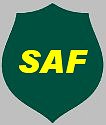| Back to |
|
|
| MSUE Resource Library | ||
| Newspaper Article Index | ||
| Forest Information Main Page | ||
| MSAF Home Page |

SELECTING
LOGGERS
Article #41, November 2000
By Bill Cook
Logging is serious business for a forest owner. Once it is done, the results will have a long-term impact on the forest. And it can’t be “undone”. Quite naturally, a forest owner should experience some concern about whether or not a harvest will really be what they want.
Timber harvesting is a good thing. Getting the job done right is another thing.
Most forest owners will have only one or two harvests in their lifetime, even assuming they own the same land for a lifetime. So, this is not something most people have a lot of experience with. A proper timber harvest can be a complex thing. And then there are the logging horror stories.
If a timber buyer comes knocking on your door offering you a deal that sounds too good to be true . . . it probably is. Beware.
Now, most loggers and timber buyers are decent, honest, hard-working people. They have families. They are involved in school and community activities. They are an important part of our rural economies. But like any other profession, bad examples travel the grapevine farther and faster than good examples.
If you are considering a timber sale, whether it’s your own idea or one suggested to you, it pays to think things through. Get professional advice. Contact a forester or two. Chances are that your timber is worth more than you think, especially if someone is actually “beating a path to your door” to buy it.
"Stumpage" is the price a logger offers to pay you for your standing trees. There are many factors that go into the valuation of standing trees. What your neighbor received may or may not be what you should receive.
Always use a written timber sale contract, the best tool for a clear understanding between you and your logging contractor. Neither of you want any surprises. Examples can be obtained from your County Extension Office, Conservation District, the DNR, and other places.
Understand what is in the contract and what the post-logging forest should be. Make certain that you understand what the contract says, especially exactly what is being sold. This is where a third-party forester is easily worth any fee they might charge.
Check out the logging contractor.
Quality loggers are professionals and they act like professionals. They are in good standing with professional organizations and participate in logger education and training opportunities. They have good references and matching reputations within the forestry community.
If you exercise some patience and do your homework, the chances of getting “ripped-off” or being dissatisfied with a timber harvest are greatly minimized. You will be able to smile as you take the money to the bank. Treat the monetary and ecological values in the same way you would treat other high value asset. Don’t underestimate the value of timber. Be careful. Be deliberate. Be successful.
Where can you obtain information? Try some of the following.
MSU County Extension
Office, there’s a number in your phone book.
MSU Extension Forester (Bill Cook), 1-906-786-1575.
County Conservation Districts, there’s a number in your phone book.
Bob DeVillez, DNR-Newberry, 1-906-293-5669, x4043.
Byron Sailor, DNR-Baraga, 1-906-353-6651.
Michigan Forest Resource Alliance, 1-800-474-1718.
Michigan Forest Association, 1-313-665-8279.
Michigan Association of Timbermen, 1-906-923-3236.
Forestry Consultants, look in the yellow pages under “foresters”.
Howard Lindberg, MeadWestvaco Landowner Assistance
Forester, 1-906-786-1660, x2191.
Do you like using the Internet? Try some of these websites.
Michigan Society of
American Foresters: http://forestry.msu.edu/msaf
Michigan Forest Resource Alliance:
http://www.mfra.org
Michigan Forest Association:
http://www.mfa.nu
Michigan Association of Conservation Districts:
http://www.macd.org/macdset.html
Natural Resources Conservation Service:
http://www.info.usda.gov/NRCS/mi/
Timber Buyers Network: http://www.timberbuyer.net/
Forest Landowner’s Guide to the Internet: http://www.na.fs.fed.us/pubs/misc/ir/index.htm
- 30 -
Trailer
Bill Cook is an MSU
Extension forester providing educational programming for the entire Upper Peninsula.
His office is located at the MSU Upper Peninsula Tree Improvement Center near
Escanaba. The Center is the headquarters for three MSU Forestry properties in
the U.P., with a combined area of about 8,000 acres. He can be reached at cookwi@msu.edu
or 906-786-1575.
Prepared
by Bill Cook, Forester/Biologist, Michigan State University Extension, 6005
J Road, Escanaba, MI 49829
906-786-1575 (voice), 906-786-9370 (fax), e-mail: cookwi@msu.edu
Use
/ reprinting
of these articles is encouraged. Please notify Bill Cook.
By-line should read "Bill Cook, MSU Extension" Please use the article
trailer whenever possible.
Michigan State University is an affirmative action equal opportunity institution. The U.S. Department of Agriculture prohibits discrimination on the basis of race, color, national origin, gender, religion, age, disability, political beliefs, sexual orientation, and marital status or family status. (Not all prohibited bases apply to all programs.)

This website is maintained by Bill Cook, Michigan State University Extension
Forest in the Upper Peninsula. Comments, questions,
and suggestions are gratefully accepted.
Last
update of this page was
22 September, 2005
This site is hosted by School of Forest Resources and Environmental Science at Michigan Technological University.